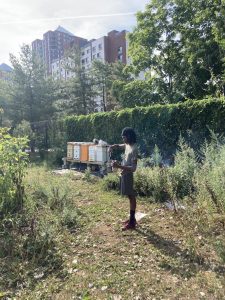
UConn Extension is delighted to announce that eighteen new and beginning farmers are receiving climate smart microgrants fueled by Connecticut Department of Agriculture’s Climate Smart Farming: Agriculture and Forestry Grant. UConn Extension was one of 12 recipients and received a total of $500,000 with nearly half of that to be distributed through microgrants which will help Connecticut’s beginning farmers purchase essential equipment, tools, seeds, soil amendments, installation costs paid to contractors, and farm field preparation costs that are recommended by UConn Extension professionals to implement new climate smart farming practices.
Microgrants are valued up to $2400 per recipient and each recipient is a beginning farmer in Connecticut with less than 10 years of experience operating their own farm business. These microgrants provide critical support to this group of farmers that are often facing significant financial constraints in launching their businesses. With this infusion of funds, farmers have a tangible opportunity to implement innovative practices they would otherwise have to put off until they have more disposable income. Farmers that can implement these climate smart practices as they start their farming career will be better prepared to combat the effects of climate change as they grow their businesses.
Each microgrant recipient must also complete the UConn Extension’s Climate Smart Adaptation Strategies Course to help them understand the best climate smart practices for their farm. This course includes 12 modules taught by professionals from UConn Extension and relevant fields that provided insight on best practices for our changing climate in topics such as, “Managing Native Species, Invasive Plants, and Noxious Weeds,” “Silviopasture,” and “Managing Water on the Farm”. Knowledge tests in the course helped develop a better understanding of Climate Smart Farming practices, for the various types of farm operations they run.
The microgrant program relies on a committee of advisors with experience implementing climate smart practices on their own farms to evaluate grant applications. Jiff Martin, UConn Extension Educator and Project Director, shared, “We are so excited by the quality of applications that we’ve seen so far in the program from beginning farmers demonstrating a real appetite and drive to lead the future of climate smart farming in our state.”
Janet Kramka, owner of Backyard Blooms in Trumbull CT, was one of the recipients of a micro-grant. Through this infusion of funds, she purchased silage tarps, a broadfork, row covers, and put funds toward a new irrigation system. These tools will help her implement practices that encourage biodiversity in her soil, conserve water, and protect her crops from temperature extremes and pests. As Janet notes, “We’re very grateful to be able to put these tools into practice much sooner than we would have without assistance, and we’re looking forward to seeing the many benefits that will come from the more resilient and healthier crops that will follow!”
Following receipt of the microgrant, each awardee will meet one-on-one with a UConn Extension professional at their farm to discuss the purchases made with the microgrant funds and explore future climate smart farming strategies. During the visit, photos and the farmers’ experience and growth in knowledge will be captured to share with the public and evaluate the impact these grants have on the new and beginning farmer community in the state.
The microgrants represent a significant step forward in supporting Connecticut’s agricultural community in adopting sustainable and climate-resilient farming practices, contributing to the long-term viability of the state’s agricultural sector. “With these awards, we are addressing two significant challenges to support the future of agriculture – mitigating climate change and supporting our new and beginning farmers to set them up for success. These grant funds will be used to propel producers who desire to implement climate resilient practices for long-term farm sustainability and farm viability,” said Connecticut Department of Agriculture Commissioner Bryan P. Hurlburt. “I thank UConn for their partnership in tackling these challenges and utilizing the dollars in a smart, practical manner.”
The Microgrant awardees for 2024 are:
Aasaaska Foundation LLC, Hartford – Caterpillar tunnel, shade cloth
AMMECS CO. LLC, Bridgeport – Raised bed system and hoop cover for urban growing system to protect from heavy rains
Backyard Blooms, Trumbull – Silage tarp, drip tape, broad fork, row cover
Blooms & Blessing Farm LLC, Thompson – Row cover
Brown Farm, Scotland – Chipper/shredder attachment for walk-behind tractor
Eagle Heights Farm, Canterbury – Cover crop seed, weed fabric, drip irrigation, caterpillar tunnel
Great Ring Farm, Newtown – Trench project around high tunnel and silage tarp and fertigator for soil health, beneficial insects
Joon Gardens, Danbury – Toolshed and garden cart to store and transport no-till equipment and invasive Japanese knotweed removal project
Lakeside Farm, Lakeside – French drain project (crushed stone, pipe, filter fabric), cover crop seed, insect netting, manure
Liepold Pond Farm, Pawcatuck – Topsoil, compost, ground cover
Mena’s Garden LLC, North Guilford – Caterpillar tunnel for cut flower production
Northwest Corner Farm, Winchester – BCS walk-behind tractor
Root Life LLC, New Haven – Raised bed-low tunnel system
Sekelsky’s Garden & Nursery, Monroe – Irrigation, compost, ground cover, broad fork
Sunset Farm, Naugatuck – Cover crop seed, insect netting, floating row cover, greenhouse shade cloth
Wild Woods Farmstead, Kent – Solarizing tarps, drip irrigation, cover cloth
Woody Acres Farm, Hampton – Greenhouse construction
XX Under Mountain, Litchfield – Walk-behind tractor
For more information, please contact Rebecca Toms, Communications and Outreach Assistant at rebecca.toms@uconn.edu or visit https://solidground.extension.uconn.edu/ to learn more about UConn Extension’s new and beginning farmer program.